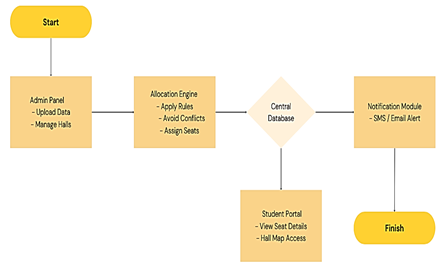Research Article | Open Access
|
Open Access
|


 | Published online: 29
May 2025
A Digital Examination Seating Allocation System to Enhance Exam Integrity
| Published online: 29
May 2025
A Digital Examination Seating Allocation System to Enhance Exam Integrity
Mohd Shafi Pathan* and Kashish Rajankumar Reshamwala
Department of Computer Science and Information Technology, MIT Art Design and Technology University, Pune, Maharashtra, 412201, India
*Email: shafi.pathan@mituniversity.edu.in
J. Smart Sens. Comput., 2025, 1(1), 25206 https://doi.org/10.64189/ssc.25206
Received: 18 April 2025; Revised: 19 May 2025; Accepted: 27 May 2025
Abstract
This paper introduces a conceptual framework for a Digital Examination Seating Allocation System aimed at enhancing exam integrity and operational efficiency in academic institutions. Traditional seat allocation processes are often manual, error-prone, and lead to confusion and delays for students before examinations. To address these challenges, we propose a system that enables students to view their assigned seats digitally prior to the start of the exam, mimicking the user experience of online ticketing platforms. This approach ensures fair, randomized seat distribution, minimizes undue advantages, and improves the overall examination environment. The proposed system leverages automation to manage student data, exam schedules, and hall layouts, thereby reducing administrative workload and improving accuracy. Key features include real-time seat mapping, QR code-based seat verification, and pre-exam notifications delivered via SMS or app alerts. These features aim to improve student preparedness, reduce last-minute disruptions, and foster a more structured and transparent exam process. This conceptual study explores the architectural design, expected outcomes, and practical implications of adopting such a digital framework, laying the foundation for future development and real-world deployment.
Graphical Abstract
Novelty statement
A conceptual framework for a digital examination seating allocation system aimed at enhancing exam integrity and operational efficiency in academic institutions.






